Editor's Note
Dear Readers,
As the weather becomes colder and Thanksgiving approaches, many students and community members continue to reflect on the past months that have been primarily spent indoors. Our ability to adapt has been continually tested as we all try to navigate our new normal.
The fourth edition of The Bold Magazine, “The Reflections,” highlights some of the takeaways, lessons and skills learned throughout the quarantine and fall experience. With a range of stories— such as the importance of food, the value of creating connections with professors and improving one’s health and organizational skills— each of us has had a unique fall semester that’s taught or shown us something different.
With the University of Colorado Boulder becoming remote for the remainder of the semester and the holidays nearing, I hope as you reflect on this past semester, there are highlights that stand out. Moments that made things a little easier, a little less scary and a lot more fun. For me, The Bold Magazine has been one of the high points for this fall, and I am grateful for all of the writers’ work and dedication as we continue to brainstorm how to make our stories better.
If you have ideas for stories that you would like to hear or are interested in joining The Bold Magazine, please feel free to contact me at: tayler.shaw@colorado.edu or email The Bold at thebold@colorado.edu. Regardless of your experience or background, we’re always looking for passionate, creative storytellers to join our team.
While people often talk about the value of looking forward, it can be just as rewarding to look back as well. I hope your reflections offer you a similar sense of community and growth as it has for these writers.
Warmly,
Tayler Shaw
Magazine Editor-in-Chief
The Comfort of Food
By: Nic Tamayo
It’s like the warmth you feel as you place your hands in front of the fireplace, or the spark you feel when someone hugs you from behind. It’s a comfortable place that relieves the stress and tension brought on by life. During this pandemic, the importance of food’s familiarity has become ever more apparent for so many people. Think back to baking banana bread and “whipped coffee” during quarantine; do you feel nostalgic? When I look back at what I made during that time, I remember how it kept me grounded.
Food is always a familiar place that I can return to if I’m feeling stressed or anxious or worried. It brings back memories of steaming stews in the dead of winter and dripping popsicles during the fiery pit of hell we call summer. Even today, as we progressively re-introduce aspects of our former lives, food continues to be a place that we can return to for comfort.
Take, for example, the bi-weekly “Comedians In Your Kitchen.” Mack Beats and Sam Bear host this CU-sponsored event in the hopes of introducing the arduous task of cooking as a task that can be fun. Or maybe, like me, you spend hours scrolling through TikTok. My “For You” page is filled with folks like Tabitha Brown, whose vegan recipes compliment her contagiously sweet persona, and Shereen Pavlides, whose sarcastic Italian mom persona is simultaneously humorous and scary. The culinary arts are ever-present in our lives; whether we make our food or get it from a restaurant or dining hall, someone has spent time preparing it.
As an avid baker, I’ve always had a passion for creating delicious meals and sweets from simple ingredients. This fascination with creation largely stems from a childhood filled with programs like Masterchef and old episodes of The French Chef. At some point, I began following recipes from old books and the backs of flour bags. Of course, an eight-year-old’s cupcakes aren’t amazing (especially on the first try), but I kept at it. As time went on, and I kept practicing, my cakes became more moist, my cookies came out of the oven without being charred and I began to experiment with new things. I started to stray away from recipes, adding in wild herbs and fresh vegetables. While cultivating successful and flavorful recipes, I also gained a new sense of confidence within the kitchen and within myself.
As my passion for the culinary arts continued to evolve, I developed in new ways as a person. I became more confident in my skin, and with this confidence came a new sense of trust that I had for myself. I gave myself the space to accept the trial and error that is necessary when creating food. I began to trust the process and understand that, even if a dish didn’t come out perfectly, I’d still acquire something from this experience.
Even so, I developed a tendency to be a perfectionist, especially when making something that I’d made hundreds of times before. Anything that will be eaten by others should be something that I’m proud of, something that I see as perfect. The development of this skill has also sharpened the knife that is my creativity. A couple of years ago, I could never imagine being able to look at a pile of ingredients and know how they’d work together in a dish. Now that I have this knowledge, I can spend more of my time brainstorming how to present what I make beautifully.
Someone who helped me develop these skills is Jenna Wageman. With a Bachelor’s degree in Zoology, she became a biology and physical education instructor at my school. After working with her in other extra-curricular activities my freshman and sophomore years, I began to help her run our school’s culinary club.
“My favorite thing that I learned from [culinary club] was that you can actually make things that people wouldn’t typically try, but if they have a hand in making it, then they’re much more willing to try it […] and much more likely to enjoy it,” says Wageman.
Wageman has taken these teachings to heart, saying that, “It’s really great to make something for myself to enjoy. Like, I really like eating what I cook, but it’s way more fun having somebody else to enjoy it and share it with.”
Creating food is the most fun when you can share that experience with others. Whether you bake cookies with your friends or help your family cook Thanksgiving dinner, the laughs that you can share with those people, and the things that they can teach you, are precious. I know this from experience.
Over the years, I’ve shared so many of my creations with my best friend, Brianna Mallett. Bree (as I call her) was vegan for a few years, which gave me a new playing field on which to test recipes. I discovered new ingredients, like “aquafaba” (chickpea juice) and “seitan.” We would spend time throwing ingredients into a pan and seeing what we could come up with.
“Remember that time we baked a cake for my birthday?” Mallett asks as we reminisce about the fun we’ve had over the years. “You did the work, and I did the decorating,” she jokes.
She continues, “It was so hard trying to make a cake that’d taste good and be vegan, but we did it. That funfetti was one of the best I’ve ever had!”
I promised her that we’d do it again soon.
Trusting relationships are important. As you begin your journey toward excellence in the culinary arts and as you become more comfortable with ingredients and experimentation, you can bring that confidence into your everyday life, just as I have. You can learn to trust the decisions that you make, you can trust yourself to make the right moves and you can trust yourself to say the right things. Especially during the upcoming months (when the frigid temperatures will keep you locked inside), take some time to explore your inner creativity through cuisine, and acquire a valuable skill that’ll last a lifetime.
A Quarantine Re-evaluation
By: Grace Naber
Quarantine left me with what seemed like nothing but time, consisting of hours, days and weeks of absolutely nowhere to go and a blank agenda of things to do. I will admit that during the first month of quarantine, all healthy habits were far out of sight and mind. After 30 days of ordering DoorDash more than I care to admit, shedding some tears and binge-watching the news and Netflix, I realized this was the perfect opportunity to cultivate healthy habits that my college lifestyle had been desperately missing. To maintain my sanity through all the uncertainty, I decided at the end of May to dedicate my quarantine to developing a more wholesome lifestyle, starting with making a major life switch to eating mostly plant-based foods.
Recognizing the importance of health and wellness started with a nutrition class I took during my freshman year in Baker Hall. One of my professors in the biology and nutrition department, Donna Louie, played an important role in inspiring me to switch up my eating habits and encouraged me to begin plant-based eating. She was the kind of professor who built a strong connection with all of her students, and her passion for nutrition was contagious. I still have all of her notes and handouts from lectures. Not only did she teach us about the human body, debunk misconceptions of diet culture and emphasize the importance of a healthy lifestyle through a detailed class project, but she would also frequently bring in snacks and cook healthy alternatives for us.
When I recently asked her what she believes are the greatest health benefits of plant-based eating, she writes via email, “the people who live the longest (like the Greeks and the Japanese) eat [a] mostly plant-based diet and seafood and have a much lower rate of chronic diseases (e.g., heart disease, cancer, type 2 diabetes) than Americans. Because their diets are nutrient-dense and complex- carbohydrate-rich, they are energetic and healthier.”
After I made the switch, I found that I had far more energy, my mind and thoughts were clearer and I felt more confident in myself. I felt in control of what I ate and learned new cooking methods and recipes I would have never previously tried. It pushed me to be more daring, encouraging me to experiment with different food groups that I thought I would never like but have come to love.
Based on Louie’s research, she believes that plant-based eating not only benefits our personal health, but also the overall health and diet of others.
“If everyone ate plant-based, we have more than enough resources to feed people everywhere in the world,” writes Louie. “Most of our energy is lost in feeding animals that we eat. If all humans become the primary consumers (eating plants like herbivores), we will have more than enough food produced by the sun.”
Being conscientious of the food we eat can also positively impact the environment. According to Louie, if we all eat more nutrient-dense and sustainable foods, like fruits, vegetables, and whole grains, “we will have less emission from CO2 and Methane […] causing climate changes, which we are currently experiencing with the fires and droughts in the West, floods in the South, and diseases.”
When starting to change eating habits, it is important to make a slow transition so you can create behaviors that are sustainable. As I first began the change towards a primarily plant-based diet, both of my parents joined the journey with me. While it was difficult at first, especially when it came to eating out, I took small steps and never penalized myself for occasionally eating meat or fast-food. I found that figuring out a balance and not obsessing over diet culture is extremely important when cultivating a healthy lifestyle. A resource that was helpful for me during this transition was a food pyramid that Louie offers to many of her classes. The pyramid outlines steps that people can refer to if they are interested in switching their eating habits to achieve a more plant-based and environmentally sustainable diet.
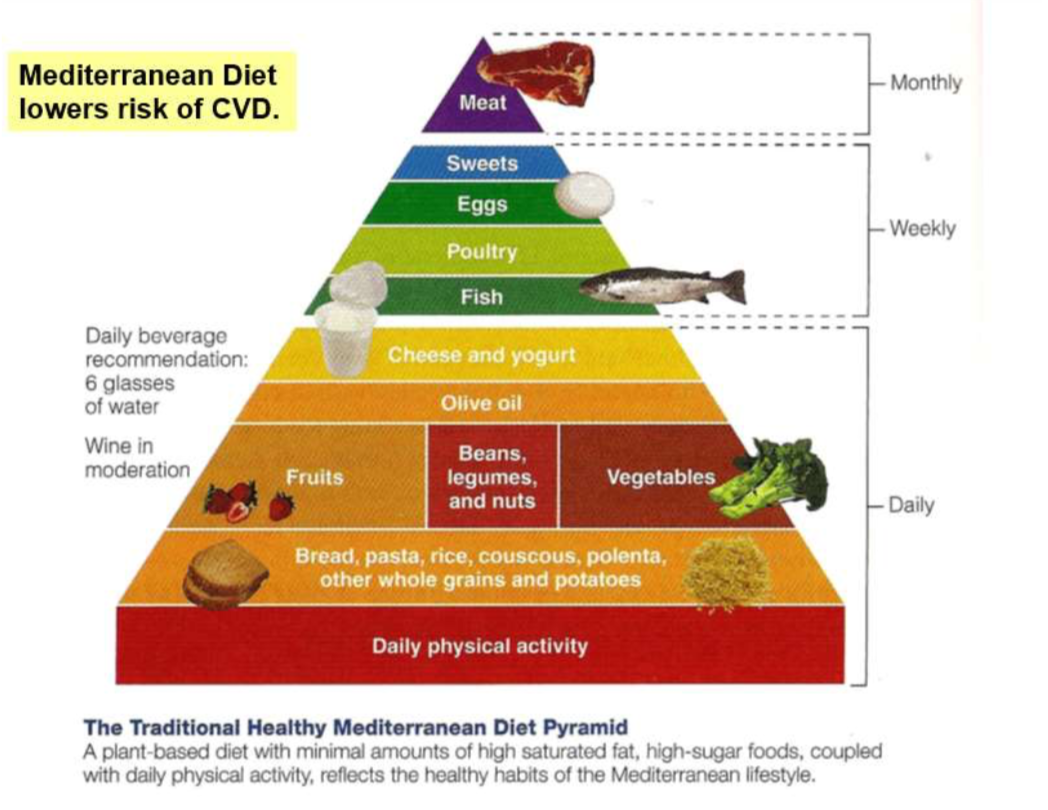
Growing up in Colorado, and in Boulder in particular, eating healthy and exercising regularly is part of the culture. According to a report by U.S. News, Boulder received an overall population health score of 96, with a life population of 80 years in comparison to the national median of 77.9 years. In addition to a wide variety of health magazines— Boulder Lifestyle, Health 5280 and Boulder Weekly, to name a few— there are also a wide variety of health-based restaurants. Some of my favorites are Flower Child, Modern Market, CAVA and Fresh Thymes Eatery. The Saturday Boulder Farmers Market is also a great way to integrate local ingredients and food sources into your diet. Boulder is abundant in health and wellness resources, making it a great community for me to be surrounded by while nurturing a healthy lifestyle.
One of my favorite plant-based meals to cook in quarantine is cauliflower bowls. There are so many different ways to cook and incorporate cauliflower into lunches and dinners. You can toss cauliflower with a multitude of sauces, put it over greens, quinoa, rice or even use it as an alternative to taco meat. Cauliflower is rich in nutrients and high in fiber and vitamin B and C. Beyond cauliflower bowls and in the spirit of the fall season, I have been experimenting with substituting different desserts and sweets with healthier options. My favorite recipe so far has been cinnamon banana chia seed pudding.
Thanks to quarantine and the endless time I’ve had on my hands, I was able to adopt this healthy habit of plant-based cooking and eating that I hope to carry throughout my life. The switch has had a strong, positive impact on my mood and my mental along with physical health. The shift to plant-based eating gave me energy to workout more frequently, spend additional time being present with friends and family, and encourage me to set up a more structured day-to-day schedule. While Louie’s nutrition class gave me the knowledge I needed to introspect my lifestyle and eating habits, quarantine gave me the time I needed to cultivate a healthier way of life.
Recipe: Cauliflower Power Bowls
- 1 bag frozen cauliflower (roasted at 450 degrees for 20 minutes or in an air fryer at 360 degrees for ~10 mins)
- Shelled/peeled edamame (from Trader Joe’s)
- 1 beat sliced (from Trader Joe’s)
- Handful of mixed greens
- Sweet Chili Sauce (from Trader Joe’s) / Peanut Sauce (from Ideal Market)
- 1 cup of Ancient Harvest microwavable organic quinoa
Recipe: Banana Chia Seed Pudding
- ½ cup almond milk or alternative milk
- 2 tablespoons chia seeds
- ½ banana, mashed
- Cinnamon (optional )
- Agave/honey (optional)
Staying connected with professors during COVID-19
By: Eden Villalovas
Click here to listen to Eden Villalovas narrate her story:
Audio PlayerAs the COVID-19 pandemic has forced colleges to uproot their traditional teachings and transition to virtual learning, students and teachers have to face the harsh reality that building a relationship while social distancing will be a challenge. Although communicating with your professors will look different this year, making connections and expanding your network is still possible.
1. Introduce yourself early
It’s important to recognize that losing the face-to-face everyday interaction with your professor does not mean you will go unnoticed online. Taking the time to introduce yourself early on will build a foundation for your relationship for the rest of the semester. Simply sending an email introducing yourself and what you hope to gain from the course will show your professor you are involved and engaged in the material.
Cindy White, the associate dean for undergraduate CMCI curriculum and programs, gives advice on how to introduce yourself and connect with your professor.
“Faculty really do want to get to know students in order to make the class the best experience possible,” says White. “Knowing about students’ goals, interests and skills or abilities outside of class can be useful for faculty and engaging with faculty in a more informal way can help students feel more connected to learning.”
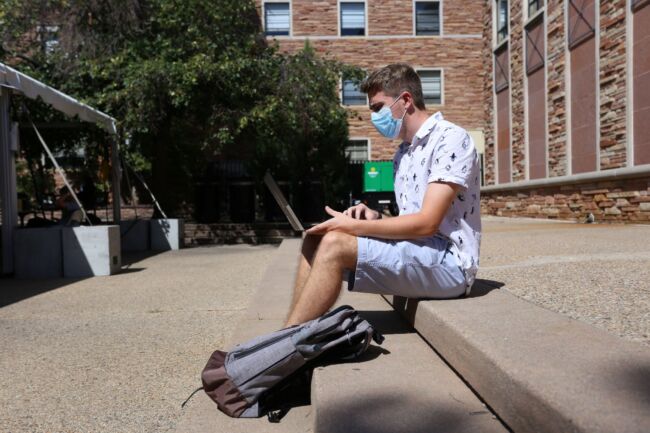
Max Gannett, CU junior and lead ambassador for CMCI, explains the importance of reaching out to your professors.
“When you reach out, tell them a little about yourself and where and what you are interested in. It always helps because professors are interested in you just as much as you are with them,” says Gannett.
2. One-on-one meetings
Office hours are a great tool to connect one-on-one with your professor and show them that you are willing to go above and beyond the requirements of the course in order to build a professional connection with them. Associate Professor Erin Willis, who teaches and researches advertising, public relations and media design, gives her opinion on how to stay connected over Zoom.
“I’m all about meeting on Zoom, if that’s what is comfortable for students,” says Willis. “I encourage my large introductory lecture to meet with me on Zoom and earn extra credit. How easy is that? So many students don’t realize the full potential of their professors to help them on their college journey.”
Take advantage of online office hours to check in with your professor and allow them to get to know you as a student. Scheduling an online meeting rather than sending an email is the best way to discuss any questions or problems you may have with the course, as it’s the closest thing to an in-person meeting.
3. Communication Through Virtual Platforms
Phone calls are another great way to stay in touch with your professor. Since this semester is radically different than previous ones, reach out to your professor and ask them what ways they are comfortable communicating.
Gannett encourages students to see the positives of using Zoom as a form of communication in order to connect with your professors.
“Zoom allows for you to grow yourself to be better equipped for an ever changing landscape and presents you with challenges you haven’t seen before,” says Gannett. “Learning to navigate this new landscape and how you are within it, will help you make the most of this weird time.”
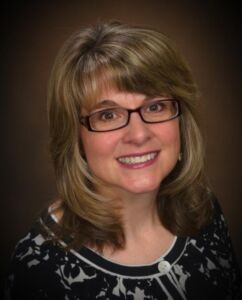
For questions that don’t require a Zoom call with your professor, knowing how to send an email properly is a crucial communication skill. With online classes, many professors’ inboxes will be full of emails from students, as it is now one of the only forms of communication. When communicating with your professor, it is important to know how to send an email efficiently so your professor can reply without any questions or confusion.
“Email can also be a good way to share some information about why you are taking the course or about interests you have related to the course,” says White.
Your professor will appreciate a concise, straightforward email. All professors have different preferred styles of email etiquette. If they do not specify their preferred style or appropriate hours of communication, finding out that information early into the semester will insure a solid line of communication for you and your professor.
4. Ask questions
Be willing and ready to speak up during online discussions. Everyone, including your professor, is adapting to remote learning as they go. Engaging in the material, asking questions and communicating with your classmates during a virtual lecture is important to your success.
Reach out to your professor when you need help, same as you would in an in-person classroom environment.
“This isn’t our forever, so learn what you can about doing business and working in this virtual world,” says Willis. “It’ll only make you a better job candidate in the future. Your flexibility and resiliency truly says a lot about your character.”
White expresses the importance having a strong community is for college students and what that looks like during a pandemic.
“We know that students learn best in community. Being part of a community means being engaged with the ideas, and caring about others who are part of the community,” says White. “Working hard to help support your classroom community can go a long way toward helping everyone have a more meaningful learning experience.”
Navigating how to communicate through the pandemic may seem overwhelming, so putting in extra effort to stay connected will greatly improve your online class experience for you and your professor.
Becoming organized in college
By: Piper Vaughn
Transcript:
I’ve always considered myself to be an organized person. However, after becoming a college student, I am now more organized than ever.
Being organized was very important for me when I came to college, because I knew that if I didn’t have an order to the way I approached my schoolwork, I would not be doing as well academically as I am now.
I’m here to let you in on some of my tips that have helped me along my college journey.
First off, you need to get yourself into a routine. For me, on school days I wake up no later than 9:30 a.m. to start my day. I then go workout– whether it’s a run, a walk or a gym class, get your body moving! This helps me not only feel better mentally when I am stressed, but it also helps me feel way more productive throughout my day.
I then get ready for the day. If you haven’t heard the statement “dress well, test well,” get to know it because this tip has really worked for me.
Next, get yourself a planner. I know planners are not very popular these days, but they have helped me so much academically. I write everything in my planner, and I start every week with writing out all the class homework that I have for the week. I, then, put boxes to check off next to the assignment. This makes me feel more accomplished and also helps me keep track of what I have and have not done in order to make sure that I don’t miss an assignment.
Also, with classes being online, I wear blue light glasses from Amazon that help your eyes when looking at a computer screen all day. Along with this, I also drink caffeine. Whether it is tea or coffee, I always enjoy having a pick-me-up when I am tired. This isn’t necessary, but it helps keep me focused and able to look at my screen for long periods of time without my eyes hurting and without falling asleep, so this is a plus.
Getting organized is hard, and it honestly has taken me a while to get used to these habits. This won’t happen overnight, and it won’t suddenly get you a 4.0 GPA.
These tips aren’t for everyone, but for me, implementing these tips into my life has helped me feel more productive, more accomplished and kept me on track along my academic journey.
Magazine Contributors
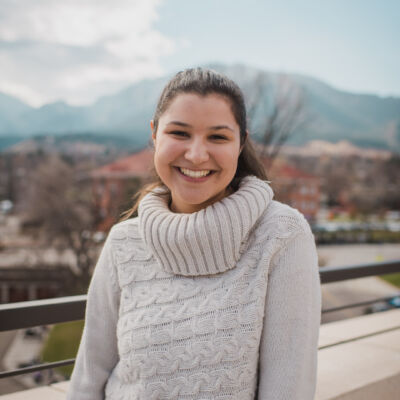
Tayler Shaw is a senior majoring in journalism and Spanish for the professions and minoring in anthropology and leadership studies. She is from Littleton, Colorado. Her interests include explanatory and solutions journalism on topics ranging from education, culture and community-based issues.

Nic Tamayo is a freshman studying journalism at CU. Originally from Colorado Springs, he’s an avid baker, a lover of literature and a (former) barista.

Eden Villalovas is from San Diego, California and is majoring in journalism with a minor in philosophy. She is interested in attending law school after graduation and pursuing a career in politics.
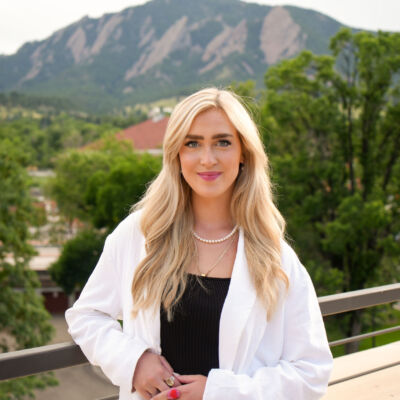
Piper Vaughn is from Castle Rock, Colorado, and is a senior majoring in journalism with a minor in english. Vaughn is the Arts and Entertainment editor and will also be taking on The Bold’s new video section! She enjoys her dog, spending time with friends and family and loves to run. Piper has been involved in several organizations including The Bold, CMCI Honors Program, NewsTeam Boulder, Alpha Phi, and was a fellow for News21 in Phoenix, Arizona.

Grace Naber in a junior studying Public Relations with a Business minor and a certificate in International Media. She is from Boulder, Colorado and loves to cook plant-based food, travel, ski, trail-run and do yoga.

